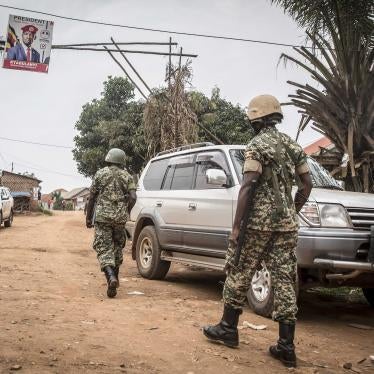The Ugandan government must prosecute perpetrators of torture, said Human Rights Watch and the Ugandan-based Foundation for Human Rights Initiative today.
Last week during its session in Geneva, the United Nations Committee Against Torture reviewed Uganda’s initial report. In its report, the Ugandan government explained measures it has taken against torture to comply with its obligations under the Convention Against Torture and Other Cruel, Inhuman or Degrading Treatment or Punishment. On Friday this week, the U.N. committee is scheduled to publish its conclusions and recommendations to Uganda.
In a 14-page briefing paper submitted to the U.N. committee, Human Rights Watch and the Foundation for Human Rights Initiative documented recent cases of torture by Ugandan security forces against political opponents, alleged rebels and criminal suspects.
“Torture persists in Uganda because no one is investigated or punished for it,” said Livingstone Sewanyana, director of the Foundation for Human Rights Initiative, based in the capital Kampala. “If the government were serious about stopping torture, it would end this state of impunity.”
The briefing paper shows that torture frequently occurs when suspects are held by agencies other than the regular police. These bodies notably include the Joint Anti-Terrorism Task Force (JAT), the army, Chieftaincy of Military Intelligence (CMI), and the Violent Crime Crack Unit (VCCU).
“Suspects are sometimes held in ‘safe houses’ by military and intelligence agents,” said Juliane Kippenberg, researcher in the Africa division of Human Rights Watch. “The use of such shadowy, unofficial places of detention makes torture much more likely.”
Human Rights Watch said that the Joint Anti-Terrorism Task Force uses a large house in Kampala’s upscale Kololo neighborhood for interrogating and torturing detainees. This clandestine “safe house” is located next to an ambassador’s residence.
Last week, in the presentation of its report to the Committee Against Torture, the Ugandan government described current legislation and administrative measures on arrest and detention. However, the report made little reference to how Ugandan security forces apply these laws in practice.
“Practices of torture erode government credibility, traumatize society and cause fear,” said Sewanyana. “The United Nations should urge the Ugandan government to tackle the roots of torture head-on.”
In a written response to Human Rights Watch and the Foundation for Human Rights Initiative, the Ugandan government denied allegations that its security agents practice torture and stated:
- “Allegations concerning mistreatment of opposition politicians, e.g. FDC and Reform Agenda are unfounded.”
- “The alleged JAT detention centre in Kololo is actually an office block used by the JAT and is neither used for torture nor detention of suspects.”
- “Access to prison and military facilities has often been granted to the Uganda Human Rights Commission, the ICRC and Parliamentary Committees whenever they have expressed interest in visiting. However, there are regulations world-wide on visits to security installations due to the nature of activities in such places.”
- “There is no confusing array of security organs in Uganda as alleged by the report. Different security organs have different roles and responsibilities as defined under their statutes… Under Ugandan laws it is not only the police that have powers to arrest and even private citizens may arrest and hand over culprits to the police.”
“We believe that dialogue with the Ugandan government about torture is critical to ending it,” said Juliane Kippenberg. “However, we take issue with the government’s denial of the fact that torture is widely practiced by Ugandan security forces.”
Human Rights Watch and the Foundation for Human Rights Initiative called on the Ugandan government to enact legislation to punish perpetrators of torture and those who maintain and use “safe houses” and to change legal provisions that mandate detention of treason and terrorism suspects for 360 days after preliminary charges are filed, without bail.
“The Ugandan authorities need to close down unofficial places of detention and make criminal prosecution of torture a priority,” Kippenberg said.
Uganda should also ratify the U.N. Optional Protocol to the Convention Against Torture, which allows national and international monitors to conduct regular visits to all places of detention.





